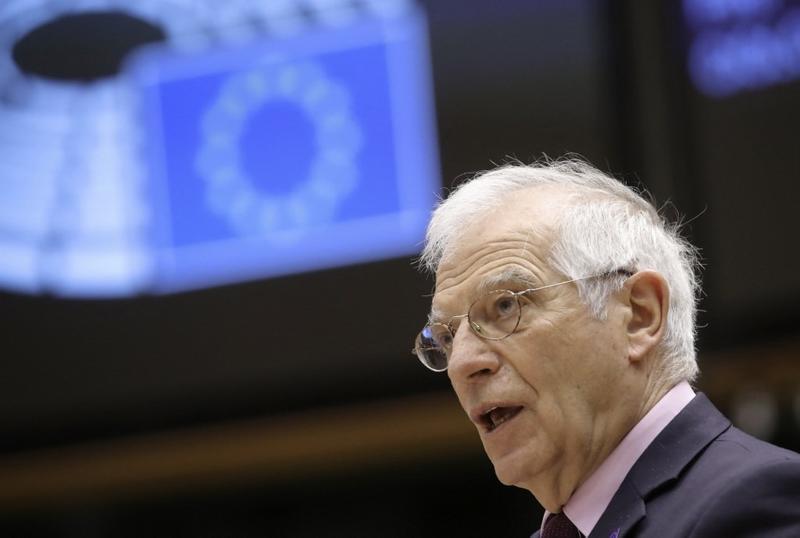 The European Union's top diplomat Josep Borrell speaks during a debate following his visit last week to Russia during a plenary session of the European Parliament, in Brussels, Belgium on Feb 9, 2021. (OLIVIER HOSLET / POOL /AFP)
The European Union's top diplomat Josep Borrell speaks during a debate following his visit last week to Russia during a plenary session of the European Parliament, in Brussels, Belgium on Feb 9, 2021. (OLIVIER HOSLET / POOL /AFP)
BRUSSELS - The European Union’s top diplomat warned Moscow on Tuesday it could face new sanctions over the jailing of Kremlin critic Alexei Navalny, describing the government of President Vladimir Putin as “merciless”, authoritarian and afraid of democracy.
Josep Borrell said his visit last Friday to Moscow had cemented his view that Russia wanted to break away from Europe and divide the West, in a speech marking the EU’s harshest criticism of Moscow since Russia’s 2014 annexation of Crimea.
“The Russian government is going down a worrisome authoritarian route,” said Borrell, who pleaded for Navalny’s release in Moscow and sought in vain to visit him in prison.
Josep Borrell, the EU's top diplomat, said his visit last Friday to Moscow had cemented his view that Russia wanted to break away from Europe and divide the West, in a speech marking the EU’s harshest criticism of Moscow since Russia’s 2014 annexation of Crimea
“There seems to be almost no room for the development of democratic alternatives ... they are merciless in stifling any such attempts,” he told the European Parliament, saying that he believed the Kremlin saw democracy as an “existential threat”.
ALSO READ: Russia expels European envoys over Navalny protests
Borrell’s remarks suggested a hardening of EU attitudes to Russia, a big energy provider to Europe, after years of seeking better ties despite Western sanctions imposed in 2014.
“Russia seeks to divide us,” Borrell said.
Vladimir Dzhabarov, deputy chairman of Russia’s international affairs committee with the upper house of parliament, said Borrell’s statement should be deemed emotional amid the economic crisis and the novel coronavirus pandemic in Europe.
“For some reason, the European Union thinks that it can meddle in our internal affairs,” Dzhabarov said on state TV.
Russia is used to living under sanctions, Dzhabarov said, adding that Europe will be interested in cooperating with Russia to overcome its economic issues.
A spokesman for European Council President Charles Michel, who coordinates EU leaders, issued a statement in support of Borrell, accusing Moscow of an “aggressive stance” during his visit. “The EU will not be intimidated,” the spokesman said.
READ MORE: Russia bars more EU officials over Navalny sanctions
Navalny was arrested in January after returning to Russia for the first time since being poisoned last August in Siberia with what many Western countries said was a nerve agent.


